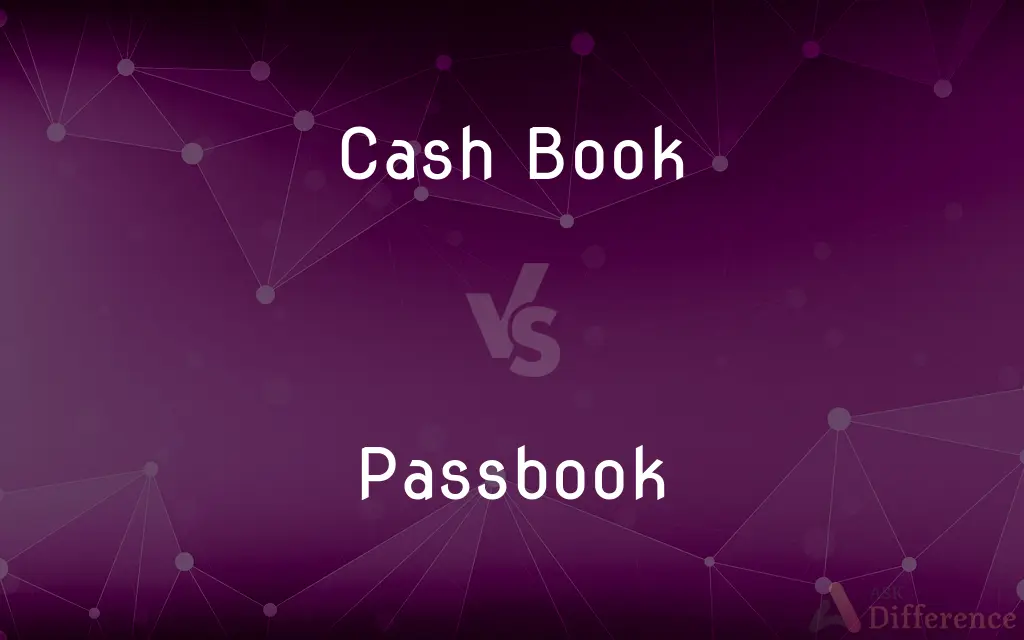Cash Book vs. Passbook — What's the Difference?
By Tayyaba Rehman — Published on October 22, 2023
A Cash Book is a financial journal maintained by businesses to record all cash transactions, while a Passbook is a booklet provided by a bank to an account holder to record transactions made against their account.

Difference Between Cash Book and Passbook
Table of Contents
ADVERTISEMENT
Key Differences
A Cash Book is a crucial accounting tool used by businesses. It is a specialized ledger that records all cash receipts and payments, ensuring financial clarity. On the other hand, a Passbook is a physical booklet provided by a bank to its account holders. This Passbook lists all the transactions, both credits and debits, for a particular account.
The Cash Book is maintained by the business or individual and serves as both a journal and a ledger in the double-entry bookkeeping system. In contrast, the Passbook is updated by the bank whenever a customer makes a transaction, ensuring the customer has a record of all their banking transactions.
Precision and accuracy are paramount in the Cash Book as it aids in ascertaining the financial position of a business. Inconsistencies between a business's Cash Book and its bank statement can hint at errors or discrepancies. A Passbook, however, serves as an assurance from the bank to its customers, reflecting the bank's version of the account's transactions.
Modern businesses often use digital tools or software to maintain their Cash Book, ensuring real-time tracking and enhanced accuracy. Meanwhile, while some banks still offer traditional Passbooks, many have transitioned to e-statements and digital banking apps, making the physical Passbook less common.
In summation, while both the Cash Book and Passbook are tools to record financial transactions, their purpose, usage, and context differ considerably. The Cash Book is an internal business record of all cash transactions, while the Passbook is a bank-provided record for individual account holders.
ADVERTISEMENT
Comparison Chart
Purpose
Records all cash transactions of a business
Records bank transactions of an individual account
Maintained By
Business or individual
Bank
Format
Both physical ledgers and digital tools
Traditionally a booklet, now also digital
Usage Context
Business accounting
Personal banking
Relevance
Essential for ascertaining financial position
Assurance of bank transactions
Compare with Definitions
Cash Book
A Cash Book is a business ledger that tracks cash inflows and outflows.
The accountant cross-referenced the Cash Book with invoices to ensure accuracy.
Passbook
A Passbook is a personal ledger given by banks to account holders.
Every quarter, he would get his Passbook updated at the bank.
Cash Book
A Cash Book captures all monetary transactions of a business.
To determine monthly expenses, she consulted the Cash Book.
Passbook
A Passbook provides a physical record of banking activities.
Her grandmother preferred updating her Passbook over digital banking.
Cash Book
A Cash Book is a comprehensive record of cash transactions.
Daily entries in the Cash Book kept the business finances transparent.
Passbook
A Passbook is a bank-issued booklet recording an account's transactions.
He checked his Passbook to verify the last deposit.
Cash Book
A Cash Book serves as both a journal and a ledger in accounting.
The Cash Book showed a discrepancy, prompting a financial audit.
Passbook
A Passbook serves as a tangible record of bank transactions.
Before digital banking, the Passbook was a primary record for many.
Cash Book
A Cash Book helps businesses maintain their financial records.
The startup benefited from maintaining a meticulous Cash Book from day one.
Passbook
A Passbook reflects credits and debits for a bank account.
After noticing an unexpected charge, she referred to her Passbook.
Passbook
See bankbook.
Passbook
A book in which a merchant records credit sales.
Passbook
A document formerly issued to a black person in South Africa and used to enforce certain legal and economic restrictions under the apartheid system. Also called reference book.
Passbook
(banking) A customer's record of deposits and withdrawals from a savings account at a bank, typically recorded in a small booklet. The bank keeps its own record, which is final in any dispute.
Passbook
(dated) A book that passes between a trader and a customer, used to record credit purchases.
Passbook
A kind of internal passport used during apartheid to limit the movements of citizens outside of their homelands or designated areas.
Passbook
A record of deposits and withdrawals and interest held by depositors at certain banks
Common Curiosities
Is the Cash Book the same as a cash register?
No, a Cash Book is an accounting record, while a cash register is a physical device recording sales and holding cash.
How often is a Passbook updated?
A Passbook is updated whenever an account holder makes a transaction or periodically when presented to the bank.
Is the Passbook still relevant with digital banking?
While digital banking is prevalent, many people, especially in certain regions or older generations, still prefer Passbooks.
What if there's a discrepancy between my Passbook and actual bank balance?
Discrepancies should be discussed with the bank immediately to rectify errors or clarify doubts.
How often should a business update its Cash Book?
Ideally, businesses should update the Cash Book daily to ensure financial accuracy.
How do I get my Passbook updated in the digital age?
Many banks still have kiosks or counters to update Passbooks, though digital banking often provides e-statements as an alternative.
What transactions are recorded in a Cash Book?
A Cash Book records all cash transactions, both receipts and payments, of a business.
Is maintaining a Cash Book mandatory for businesses?
While not always legally mandatory, maintaining a Cash Book is crucial for financial clarity and good business practice.
Can I view transactions older than a year in my Passbook?
Typically, Passbooks show recent transactions; for older records, one might need bank statements or e-statements.
Are electronic versions of the Cash Book available?
Yes, many businesses now use accounting software or apps for maintaining their Cash Book.
Can an individual maintain a Cash Book?
Yes, individuals, especially self-employed or freelancers, can maintain a Cash Book for financial clarity.
Are there charges for updating a Passbook?
Usually, banks do not charge for updating a Passbook, but policies can vary.
Can I reconcile my bank statement using my Cash Book?
Yes, businesses often reconcile bank statements using their Cash Book to ensure consistency and accuracy.
Is the Passbook a proof of bank balance?
While a Passbook reflects transactions, the most current proof of balance would be a bank statement or balance inquiry.
How does a Cash Book differ from other business ledgers?
The Cash Book is specific to cash transactions, while other ledgers might track assets, liabilities, or equities.
Share Your Discovery

Previous Comparison
Business Risk vs. Financial Risk
Next Comparison
DNA Polymerase vs. RNA PolymeraseAuthor Spotlight
Written by
Tayyaba RehmanTayyaba Rehman is a distinguished writer, currently serving as a primary contributor to askdifference.com. As a researcher in semantics and etymology, Tayyaba's passion for the complexity of languages and their distinctions has found a perfect home on the platform. Tayyaba delves into the intricacies of language, distinguishing between commonly confused words and phrases, thereby providing clarity for readers worldwide.














































